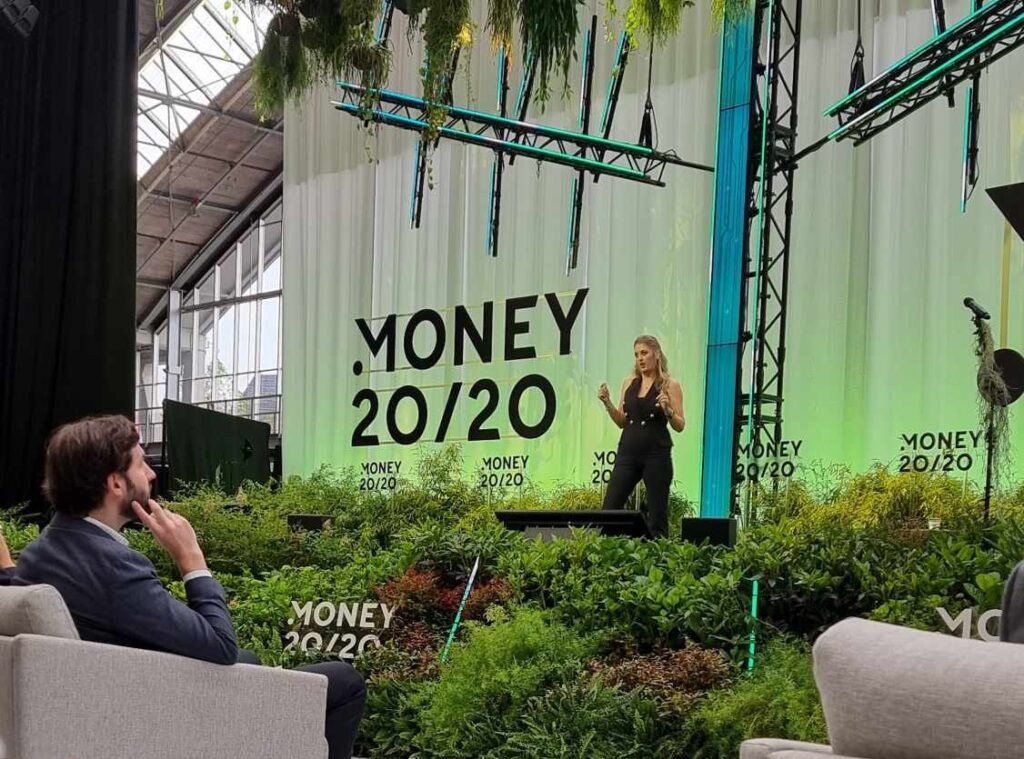
Money20/20 Europe is back at the RAI in Amsterdam for three days of industry insights, networking, collaboration and companies showcasing their latest products and services. Here’s our highlights from day one.
Scarlett Sieber, Money20/20’s chief strategy and growth officer, opened the show on the Na.i.ture stage – a very green setting with an abundance of trees and plants that will apparently find a new home once the event is over. While welcoming attendees, she addressed the “tricky funding landscape” but suggested that “fintech is maturing”.


Sieber also highlighted the overarching theme of the conference: human by machine. This theme examines the relationship between AI and technology, and how to bring out the best in each other. Clearly coffee is needed for this collaboration with a less successful start for the AI co-host, Aiana, who took their time to rouse and get with the agenda.
Luckily, after revealing their hobbies of fintech, animal welfare and gardening, Aiana was with it enough to introduce Revolut‘s VP profitability and global business, David Tirado Blanco, to the stage for a conversation with Money20/20’s content director Gina Clarke.
They delved into Revolut’s growth and expansion into new markets, focusing on primary banking and customer experience. They also discussed the company’s strategies to shakeup the financial industry through innovation and localisation, prioritising customer needs and ensuring profitability.
“The key focus, especially in Europe is to go deeper into primary banking. That’s what we are really working towards. And on that front again, we have to keep evolving, keep innovating with new propositions that are delivering services that are 10 times or 100 times better than what they are getting today in the market.”


Global expansion
Over on The Exchange Stage, Prince Constantijn van Oranje-Nassau of the Netherlands, alongside Nicola Ebmeyer, co-founder and CEO of analytics company Gain.pro and Hong Fang, president at OKX, a Web3 company, took a deep dive into the realities on global expansion for fintechs.
They discussed the challenges of navigating regulation, funding and cultural differences, as well as advice for those looking to take the leap.
Ebmeyer commented “For me, the most important thing is to start thinking about what kind of business you want to be very early on. Do you aspire to become a local business? Maybe because your solution asks for it? And then the second question is, what kind of local businesses do you want to be – what do you want to produce?
“Do you aspire to go for international leadership in the space? If the answer is yes, then it’s super important to build your product internationally from day one, because it’s really difficult to stay with one country for a couple of years and then move. Your technology will likely be very deeply rooted in the cultural specifics so think about it very early on.”
Meanwhile, Van Oranjie added: “Talent is a main issue anywhere especially when expanding internationally- so get your leadership in place.”


Trends in AI
Then, before we tucked into the NVIDIA and Microsoft discussion panel at The Exchange Stage that addressed the latest trends in artificial intelligence, we were foiled in our attempts to obtain an elusive Money20/20 gold coin, exchangeable for merchandise. The struggle for a Money20/20 T-shirt continues…
At least we got a seat in the jam-packed session, as Patrice Amann, EMEA financial services business lead at Microsoft and Kevin Levitt, director, financial services at NVIDIA, discussed next gen digital assistants and how they’re rewriting the banking customer experience.
Litt said: “In terms of use cases, I would say that there was tremendous and still is a lot of pressure for the executive teams to deliver Gen AI applications and solutions. One of the lessons that we’ve learned over the past year is that without being able to build a solution specific to your business needs and your customers, and unless you can integrate your own data into the development of that generative AI, you’re not going to get the accuracy that your business demands.
“It’s a cycle now, the use cases experiences over the past year have driven companies and financial services companies in particular to find that level of accuracy that gives them the chance to not only leverage and against external problems, but to really suit production externally.”


Announced at lunch in the Press Lounge
While enjoying the spicy delights of a hot curried lunch in the press lounge, we heard that:
- Mastercard and bunq has unveiled an open banking partnership. It means bunq users can add bank accounts from other banks in one place. The open banking feature is powered by AI – using bunq’s AI money assistant called Finn.
- Account-to-account payment infrastructure provider Token.io and Dublin-based payment orchestration platform Prommt are teaming up to enhance the user experience of open banking payments.Prommt is the first partner to leverage Token’s new hosted payment pages; enhancing user experiences and maximising conversion for Pay by Bank.
- Papara, a Turkish fintech, is partnering with DriveWealth, a fintech platform providing brokerage-as-a-service. The partnership provides Papara’s 20 million users with the ability to invest real-time in US stocks on the Nasdaq and NYSE starting in October.
- EY has been busy researching the impact of AI on the final services industry. Going forward, it predicts the industry will see improved data monetisation and customer control over their data with open finance. Financial institutions will share data more easily, leading to more fintech collaborations, especially for established banks with outdated systems. Additionally, the use of generative AI will enable highly personalised financial services for customers.
Are CBDCs a waste of time?
Then, we ventured over to the Summits and Bar as panellists discussed ‘The Elephant in the Room: Do CBDCs Solve Real Problems?’ alongside moderator Nilixa Devlukia, CEO of Payments Solved.
Ronit Ghose, global head of future of finance at CITI, gave a scathing review of the current need for CBDCs: “I agree with the sentiment that this is a solution looking for a problem. I don’t see why we need a CBDC. No one really cares about CBDCs, or is asking for them – literally no one.”
Jón Egilsson, chairman and co-founder of Monerium, also suggested that central banks shouldn’t prioritise the introduction of CBDCs: “The important role of the regulators and central banks is making sure we have the right regulation for safeguarding and making sure that consumers are safe.”


Then it all kicked off
In the afternoon, we watched former Liverpool and Feyenoord legend Dirk Kuyt on the N.a.i.ture stage with Standard Chartered as he shared lessons learnt on and off the pitch, giving several anecdotes about former managers and teammates.
He also drew a crowd at the Standard Chartered stand afterwards, as he signed Liverpool merchandise and took selfies during a networking session.


Future trends in payments
Rounding out day one at the Na.i.ture Stage, The Fintech Times’ own Polly Jean Harrison moderated a panel focused on the biggest trends in the payments space.
Noah Sharp, CEO at Vodeno, shared one trend that is increasingly impacting payments: “We see retailers and marketplaces moving more towards owning the end-to-end customer relationship. They’re less inclined to have payment providers step in. They want more white-label solutions and they want to own the journey. They want to keep their customers spending in their own ecosystem.”
Increases in fraud, as well as fraud prevention, became an important topic in the session, with Rebekah Moody, go-to-market strategy at Darwinium, explaining how preventative measures have forced fraudsters to change tactics: “I actually think banks have done a really good job of educating consumers about the warning signs of romance and investment fraud. That has meant it is a lot harder for a fraudster to instigate because it now takes a lot more social engineering – making it a longer cycle.
“As a result, fraudsters are moving to lower value, higher volume scams that’re harder to detect because they’re operating on the likes of the Facebook marketplace.”








